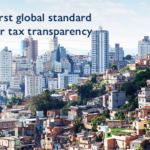ISO has assigned the leadership of the working group that will develop an
International Standard giving guidelines for social responsibility
collectively to the national standards institutes of Brazil (ABNT) and
Sweden (SIS).
This twinning of a developing country member of ISO with a developed country
is one of the measures being applied by the organization to strengthen the
participation of the developing countries that make up 110 out its total
membership of 146.
In a recent message to ISO, United Nations Secretary-General Mr. Kofi Annan
welcomed ISO’s decision to develop a standard on social responsibility,
describing it as "an initiative which dovetails well with the universal
principles of the UN Global Compact on human rights, labour conditions, the
environment and anti-corruption."
The working group on social responsibility will report directly to the ISO
Technical Management Board (TMB), which oversees the organization’s
standards development programme.
ISO will shortly issue a new work item proposal for development of the SR
standard to its member bodies. They will have three months to vote on the
proposal which will be accepted if approved by a majority of the members
voting and a commitment by at least five members to participate actively in
the work.
Member bodies who decide to participate will be encouraged to the extent
possible to nominate up to six experts, one for each of the following six
categories of stakeholders: industry, government, labour, consumers,
nongovernmental organizations and others.
At the same time, ISO will issue invitations to a number of international
organizations to participate as "liaison organizations" by nominating up to
two experts each to serve on the working group. Other interested
international or broadly-based regional organizations may apply at any time
to participate and such applications will be considered case-by-case by the
TMB whose objective is to ensure a balance of stakeholder representation
within the working group.
In accordance with the normal ISO working methods, the working group will be
charged with developing a draft standard that represents a consensus of the
views of the participating experts. At the same time, ISO expects that the
member bodies who nominate experts will also establish national "mirror
committees" and that these will formulate national positions on the
successive drafts developed by the working group.
The ultimate aim is that the consensus reached in the working group is
validated through the ISO member body votes on the draft International
Standard (DIS). Although under ISO’s rules liaison organizations cannot
vote, the rules do provide for their full and formal backing to be sought
and ISO will explicitly implement this provision on the social
responsibility standard at both DIS and final draft International Standard
(FDIS) stages.
It will be the responsibility of ABNT-SIS to organize and convene the first
meeting of the working group. ISO expects the standard to be completed for
publication in 2007.



